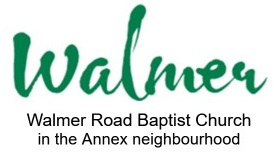This post, by Jesse Frohlich, is a reflection on the Kingdom of God Life sermon as part of the “Kingdom of God Life” sermon series.
Last Sunday Heather Weir explored Hebrews 13:1-8,15, and 16. The pragmatic tone of this passage resonates with me. A few points stuck out to me in particular:
We are told to remember others in need (the imprisoned and the abused) because we are of the same body; this brings new light to “loving others as ourselves.” The image of the body of Christ is an intimate, corporeal metaphor that serves to remind us of our unity.
Verse 15 calls us to “offer up a sacrifice of praise to God, that is, the fruit of lips that give thanks to his name.” This is such rich language that carries undertones that our thanksgiving has a more profound value than what is on the surface. Our gratefulness bears fruit.
Christian virtue is something we grow into, not something we lose. This is a good reminder that living a Christian life isn’t about never making mistakes; it’s about accepting the grace of forgiveness, growing, and learning from our mistakes. That we often equate chastity with sexual inexperience detracts from the work involved in building virtue. Upholding the value of marriage is an active process, not as simple as “avoiding sex.”
Heather outlined this passage as a “checklist of Christian duties,” which is not an end-goal, but more of a training exercise. As an avid cyclist, it’s time for a biking metaphor. Recall the song “Life is a Highway” and push that image to the extreme. Suppose your life consisted of travelling along a road. You have a lot of freedom in how you live your life, and accordingly, a lot of freedom in how you get from point A to point B. Do you take the bus? Walk? Carpool? If you would humour me, suppose the way Jesus brought to Earth was cycling. Jesus arrives and proclaims the good news about this new way of moving about the city, from the benefits of physical exercise, the reduced environmental impact, to avoiding congestion by using bike lanes.
This passage does not tell us how to be a cyclist, but rather reminds us of good cycling practice: refilling the tires, changing the brake pads, truing the wheel, respecting the danger of motor vehicles. Jesus gave us a bike! To ride it well, we need to keep up our practice and maintenance of this gift.
I recently heard that the point of reading the bible is not about finding novelty. On the one hand, discovering new revelations into the nature of God and our role in Creation is a great gift (like someone giving you a lighter, stronger bicycle frame, or a rack to hold your groceries). On the other hand, we are called to *remain* Christians, taking up our crosses daily, more than we are called to *become* Christian. Jesus did not call us to manufacture bikes; he called us to be cyclists. The list of virtues in Hebrews (mutual love, hospitality, justice, chastity, and contentment) serve as markers to re-align us towards living according to the kingdom.
One etymology of the word religion is to “re-read” or “re-think”; I have also heard it is “re-aligning” oneself back to how we are meant to live. How do I build these virtues into my life? How do I encourage healthy habits? It is not about the checklist; legalism is a nasty beast, but the checklist can bring us into freedom by building habits that enrich our lives. Consistently surrounding myself with scripture and the teachings of Jesus, together with mentors who challenge me to continue growing my faith (or “tuning my bike”) is one example. Maybe I ought to build some time into my week to be consciously hospitable and welcoming.
I still have training to do.
